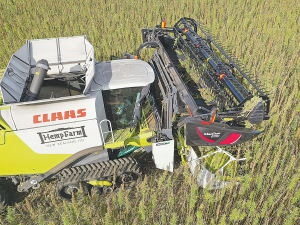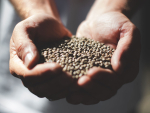The New Zealand hemp industry appears to be coming of age.
Industry players are installing NZ’s first commercial stalk-to-fibre processing plant and developing efficient harvesting machinery.
In a partnership set up late last year, Hemp NZ, NZ Yarn and Carrfields are developing a “dual cropping” harvester for handling the stalks rather than just seed and grain.
And a NZ Yarn carpet wool factory in Christchurch is being transformed into a hemp fibre processing facility with a European sourced “decortication” machine which processes stalks, separating different grades of fibre suitable for different end uses.
The harvesting machine is a mix of a combine and a forage harvester, with two harvesting heads at the front, says Craig Carr, the managing director of Carrfields and chairman of NZ Yarn’s parent company Carrfields Primary Wool.
The first, higher, machine cuts and gathers the seed and the second cuts the stalks close to ground level in the same run, leaving them on the ground for baling. The machine, still being developed, has been tested on hemp farms in Hawkes Bay, Manawatu and Wairarapa.
Carr says dual cropping is a “huge breakthrough” for NZ’s fledgling commercial hemp industry.
“Until now, the only part of the hemp crop to be harvested has been the seed,” he told Rural News. “However, multiple parts of the hemp plant can be used, and the stalk is of particular interest as a source of fibre.”
Carr says dual cropping allows farmers to maximise the return from their crops, using more of the plant and minimising crop wastage.
“We’re still fine tuning our dual cropping equipment and processes, but we’ve seen pleasing results from our trials this year,” he says. “Next summer and autumn we’ll be geared up for commercial hemp harvesting and production to begin on a significant scale.”
Meanwhile, following Hemp NZ buying a 15% interest in NZ Yarn in late 2018, the company is now installing a hemp fibre processing plant at the NZ Yarn factory in Burnside, Christchurch.
Hemp NZ says it will turn the plant into a fully fledged, modern fibre factory with equipment purpose built and engineered for hemp, rather than using modified flax mills as seen in other countries.
Dave Jordan, chief executive of Hemp NZ, says the new facility – the first of its kind in NZ and possibly Australasia – will efficiently produce a high quality fibre. This will lead to market leading innovations in hemp fibre processing.
“There are many potential consumer and industrial uses for hemp fibre. We’re excited about working with NZ Yarn to explore and develop some of the possibilities,” he says.
Processing is expected to begin in October or November using hemp stalks from the 2019 harvest.
By the 2020 harvest, 1500 to 2000ha of hemp crop is expected to be harvested and processed at the plant from North and South Island growers.
Carr believes the Hemp NZ, Carrfields and NZ Yarn partnership is placing NZ at the front of hemp innovation globally.
“Commercial hemp production is being developed in Europe, but we’ve now caught up with them in technology, infrastructure and innovation.”
It ain't weed
Commercially grown hemp differs from its illegal cousin cannabis (marijuana) in not containing THC, says Hemp NZ chief executive Dave Jordan.
“Hemp has been stigmatised and under-appreciated for decades,” he claims. “But we’re working to change people’s perceptions of this valuable commercial crop which can provide a good return for farmers and processors.”
Jordan reckons hemp fibre has great potential as an environmentally friendly alternative in many industries globally.
Human use of hemp fibre dates back thousands of years and is now in resurgence as many countries understand the environmental damage caused by synthetic fibres, he says.
“The resurgence in popularity of hemp is based on its excellent environmental characteristics. It is pest resistant, easy to grow organically and produces a good yield of fibre per hectare compared with many other crops.”











